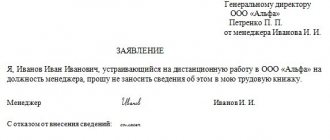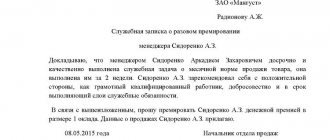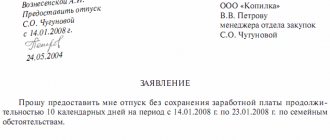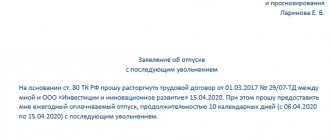In the life of almost every employee, sudden absence from work arises. In such a situation, a person can take a vacation at his own expense. The right to it is regulated by Article 128 of the Labor Code of the Russian Federation . From this norm it follows that such a vacation has the following characteristics:
- Provided without salary.
- Given based on the employee’s application.
- The employee must retain his job.
- The duration of the vacation is determined by agreement between the employer and employee.
- Since the salary is not maintained, the employer does not have to pay vacation pay for the period of such vacation.
Is it necessary to provide?
As a general rule, the employer provides the employee with leave at his own expense if there is a good reason. This could be a family circumstance or even just a desire to relax - the degree of validity of the stated reason is determined by the company itself (IP).
But there are certain situations when leave without pay is granted regardless of the employer’s wishes. These cases are collected in the following table.
Table. When is it necessary to provide vacation at your own expense?
| Category of employees and reason for which leave is granted | Duration | Base |
Any employee in the event of:
| Up to 5 days (hereinafter - calendar days) | Part 2 of Article 128 of the Labor Code |
| Employee – graduate of preparatory departments at universities and applicants | Final exams in preparatory departments – 15 days. Entrance tests – 15 days | Part 2 of Article 173 of the Labor Code |
| Employee – full-time student at a university that has state accreditation | Interim certification – 15 days per academic year. Preparation and defense of the diploma project with passing the final state exams – 4 months. Passing final state exams – 1 month | Part 2 of Article 173 of the Labor Code |
| Employee - applicant to a secondary vocational education institution that has state accreditation | Entrance tests – 10 days | Part 2 of Article 174 of the Labor Code |
| An employee who studies at a secondary vocational education institution that has state accreditation (full-time study) | Interim certification – 10 days per academic year. Preparation and defense of qualifying work and passing the final state exams – two months. Final exams – one month | Part 2 of Article 174 of the Labor Code |
| Employee – participant of the Great Patriotic War | Up to 35 days a year | Part 2 of Article 128 of the Labor Code |
| Retired employee (by age) | Up to 14 days a year | Part 2 of Article 128 of the Labor Code |
| Employee - father (mother) or spouse of military personnel who died or died due to injury, concussion or injury received during the performance of military service duties or as a result of a related disease | Up to 14 days a year | Part 2 of Article 128 of the Labor Code |
| Disabled employee | Up to 60 days a year | Part 2 of Article 128 of the Labor Code |
| An employee-parent or spouse of an employee of internal affairs bodies, the federal fire service, authorities for control of the circulation of narcotic drugs and psychotropic substances, customs authorities, employees of institutions and bodies of the penal system who died or died as a result of injury, contusion or mutilation received during service or as a result of an illness related to service | Up to 14 days a year | Part 2 of Article 128 of the Labor Code |
| Employee – war invalid | Up to 60 days a year | Subparagraph 17, paragraph 1 of Article 14 of the Law of January 12, 1995 No. 5-FZ |
| Employee is a combat veteran | Up to 35 days a year | Subparagraph 11, paragraph 1 of Article 16 of the Law of January 12, 1995 No. 5-FZ |
| Employee - member of the election commission and candidate in the elections of deputies of the State Duma, President of the Russian Federation | The period from the date of registration of the federal list of candidates by the Central Election Commission of Russia until the day of official publication of the results of the elections of deputies of the State Duma. The period from the date of registration of candidates by the Central Election Commission of Russia until the day of official publication of the results of the elections of the President of the Russian Federation | Part 4 of Article 22, Part 1 of Article 47 of the Law of May 18, 2005 No. 51-FZ, Part 14 of Article 11 of the Law of November 26, 1996 No. 138-FZ, paragraph 3 of Article 16, paragraph 1 of Article 42 of the Law of January 10, 2003 No. 19-FZ, Part 14 of Article 11 of the Law of November 26, 1996 No. 138-FZ |
| A military officer who served in military units, military educational institutions that were not part of the active army, during the period from June 22, 1941 to September 3, 1945 for at least six months, or a military serviceman awarded orders or medals of the USSR during this period | Up to 35 days a year | Subparagraph 9 of Article 17 of the Law of January 12, 1995 No. 5-FZ |
| An employee who worked during the Great Patriotic War at air defense facilities, local air defense, construction of defensive structures, naval bases, airfields and other military facilities within the rear borders of active fronts, operational zones of active fleets, on front-line sections of railways and highways | Up to 35 days a year | Subparagraph 10, paragraph 1 of Article 19 of the Law of January 12, 1995 No. 5-FZ |
| Employee awarded the badge “Resident of besieged Leningrad” | Up to 35 days a year | Subparagraph 9, paragraph 1 of Article 18 of the Law of January 12, 1995 No. 5-FZ |
| An employee working in the Far North and areas equivalent to the Far North, traveling to the place of vacation | Determined depending on the time required to travel to the place of use of the vacation and back | Part 3 of Article 322 of the Labor Code of the Russian Federation |
| Employee – teaching worker of an educational institution (at least every 10 years of continuous teaching work) | 1 year | Article 335 of the Labor Code of the Russian Federation |
| Employee - Hero of the USSR, Hero of the Russian Federation or full holder of the Order of Glory | Up to 3 weeks per year | Clause 3 of Article 8 of the Law of January 15, 1993 No. 4301-1 |
| Employee - Hero of Socialist Labor or full holder of the Order of Labor Glory | Up to 3 weeks per year | Part 2 of Article 6 of the Law of January 9, 1997 No. 5-FZ |
| An employee is a spouse of military personnel from among civilian personnel working in the Special Facilities Service under the President of the Russian Federation, who are granted leave at their request simultaneously with the leave of military personnel on the basis of an application and a certificate from the place of military service of military personnel on the duration of their main leave and its terms carrying out | Part of the leave of military spouses that exceeds the duration of annual leave at their main place of work | Clause 1 of the order of the Main Directorate of Special Programs of the President of the Russian Federation dated August 31, 2009 No. 30 |
| Employee - people's vigilante and other freelance police officers | Up to 10 days a year | Clause 3 of Article 26 of the Law of April 2, 2014 No. 44-FZ |
Civil servants rest differently
They were affected by the latest changes made to the content of the Labor Code. In particular, the duration. According to the provisions of Federal Law 79, the vacation period is calculated depending on the position and current working status of the citizen:
- employee, when replacing him in a higher/main position - 35 days ;
- filling a position within the civil service - a month ;
- other employees – 28 days .
Additional time will be accrued based on actual years of service ( a year worked will be equal to 1 additional day ). The schedule is irregular, then 3 days. If production is harmful - a week, the Far North - 24 days.
Find out important things: Who is entitled to northern pension and salary supplements?
It was. Now the accrual algorithms have changed. Now everyone rests the same way, no matter what positions people occupy. Total time – 30 days .
Only length of service is taken into account:
· 1-5 years + calendar day;
· 5-10 years + 5 calendar days;
· 10-15 years + week ;
· 15+… years + 10 days.
The annual vacation period will be 45 days (maximum). And when calculating the duration, the personnel officer will add to the standard 30 days all additional services that will be available (irregular schedule, length of service, dangerous conditions).
Vacation at your own expense - only at the request of the employee
An employer cannot send an employee on leave without pay at its discretion. This action will lead to a violation, which is subject to penalties under Article 5.27 of the Code of Administrative Offenses of the Russian Federation.
In this case, the official or individual entrepreneur will be given a warning or a fine in the amount of 1 to 5 thousand rubles . In case of repeated violation, a fine will be imposed in the amount of 10 to 20 thousand rubles . A director may be disqualified for a period of one to three years. The company will be fined from 30 to 50 thousand . In case of repeated violation, the fine will be from 50 to 70 thousand rubles.
An example of an application for vacation at your own expense
If the organization's activities are suspended
Is it possible to place employees on administrative leave if there is a break in the employer’s activities? Contrary to popular practice, this is prohibited! In accordance with Article 128 of the Labor Code of the Russian Federation, a mandatory condition for granting leave at one’s own expense is the employee’s initiative. If the activity is temporarily not carried out, you can register a downtime.
Schedule
Large organizations, employing tens or hundreds of people, set schedules annually. According to them, people work, then take vacations one by one. This keeps everyone in order and the business is constantly running and maintaining momentum. Then the absence of some is compensated by others. An extraordinary vacation may disrupt the usual schedule , so this needs to be discussed with your boss in advance. So that the HR department has time to adjust the schedule to the employee’s absence.
An employer may make a mistake and fire you illegally; read what to do about this separately.
According to the provisions of Article 123 of the Labor Code of the Russian Federation, everyone, even small firms, are required to draw up a schedule that the team, including the director, follows. This includes work shifts, meetings, holiday weekends and other events. Such schedules are posted or distributed to all departments after preparation. This helps people work calmly by planning their time in advance.
Documentation
Vacation without pay should be formalized by a regulatory act - an order or directive - in form T-6 . The basis is the employee’s statement. The document is signed by the head of the organization. The employee is also required to sign that he has read the order.
When going on unpaid leave, there are no vacation accruals, so a calculation note in the T-60 form is not issued.
Information about the leave granted should be entered in the employee’s personal card T-2 , in section VIII. The T-54 personal account card is also filled out
The employer may use similar documents developed independently.
Is it possible to recall an employee from vacation?
According to Article 125 of the Labor Code of the Russian Federation, an employer can only recall an employee from annual paid leave. Recall from unpaid leave is not permitted . This ban also applies to other types of vacations, including educational ones.
Despite the current prohibition, an employee may interrupt his vacation at will. Voluntary return to work does not contradict the Labor Code. In this case, either of the two parties can initiate the termination of the vacation. It is only necessary to agree on all the conditions for early exit.
There are two options for recalling an employee from vacation:
- The employee himself expressed a desire to interrupt his vacation. In this case, he should write a free-form application addressed to the manager about early return to work.
- When the employer is the initiator of the recall, the employee must be given notice of the early termination of leave. The employee must give his consent or refuse. If the answer is positive, consent to recall from vacation must be documented. Based on the written consent of the employee, an order to recall from vacation and return to work is issued in free form. All changes are entered into the employee’s personal card.
If the organization has only one employee
Often a company has only one employee - its director. Does he have the right to take vacation at his own expense? Yes, it is quite. There are no legal restrictions. However, this process has its own nuances.
Before the director goes on such leave, he must be appointed. O. manager - temporarily performing his duties, vested with the right to sign. After all, a company cannot operate without a leader. It must pay taxes, submit various forms of reporting and conduct business activities, which must be recorded and documented.
Procedure for registering days without payment
An order is issued.
The need for an employee to take several days without pay arises under different circumstances. Their registration should begin with an application submitted in writing. The text indicates the start date of the vacation at your own expense and the number of days without pay, as well as the triggering fact (for example, in connection with a move or the need to re-issue documents for inheritance).
Duration of leave without pay
Maximum term
If leave is provided at your own expense, which is mandatory (see table above), then its maximum is regulated by law. For example, a disabled person can count on a vacation of up to 60 days a year. In case of death of close relatives, wedding, birth of children, up to 5 calendar days are allowed.
The duration of administrative leave may change upward, but this is the employer’s right , not his responsibility.
The maximum period of additional leave provided to an employee without pay is determined by agreement with the employer. It can be either several hours or several years.
Vacations lasting more than 14 calendar days per year are not included in the length of service taken into account when determining the right to the next paid vacation. Insurance premiums for this period are also not charged.
Minimum duration
Vacation without pay can be granted even for a few hours. The employee must indicate the desired period in his application - it is written in free form.
In sections “B” and “C” of the order for granting leave in Form No. T-6, columns are entered to indicate the number of hours. Section VIII of the employee’s personal card contains information about the leave provided, and the time sheet contains the actual hours worked.
Let's say an employee takes 3 hours off. His normal working hours are 8 hours a day. In the working time sheet, the total duration of work is indicated by the number “01” or the code “I” , and the vacation time is indicated by the number “16” (code “TO” ). Payment is made according to the hours indicated on the timesheet.
The following options are possible for providing an employee with leave (legal release from work) for just a few hours :
- If you regularly use this type of leave, it is necessary to establish, on the basis of Articles 72, 93 of the Labor Code of the Russian Federation part-time mode:
- in the additional agreement to the employment contract, specify the exact start and end times of work, the deadline for installing this mode, as well as the length of the working week;
- In the time sheet it is necessary to indicate only the hours actually worked, because wages directly depend on their number.
- If this type of leave is used irregularly or if the employee is absent for less than 4 hours per working day, leave without pay should be taken out. There is no minimum duration provided for by law.
Legislative regulation
Based on Art. 128 of the Labor Code, every citizen has the right to rest. Its duration is usually 28 days, and the rest period is determined at the beginning of the year when drawing up the schedule. At this time, citizens receive vacation payments. But sometimes hired specialists encounter unforeseen circumstances in which they must temporarily suspend their work activities.
Attention! The Labor Code does not contain information about what grounds are considered valid, so this fact is assessed by the direct employer.
Administrative leave is usually granted upon the death of family members, a wedding, or the birth of a baby. But there are some employees who, according to the Labor Code, easily apply for an additional rest period, and therefore can receive it without additional compelling reasons. Sometimes the possibility of taking several days off without pay is fixed in the collective labor agreement.







